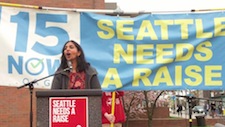Editorials Deepa Bhandaru — October 29, 2013 15:15 — 5 Comments
The Monarch Drinks With Kshama Sawant
For many Seattleites, the red signs that have sprouted up across the city, heralding a name that many have trouble pronouncing are a source of progressive pride. Kshama Sawant is running for a seat on the Seattle City Council as a member of the Socialist Alternative, and her campaign poses a credible threat to the city’s Democratic establishment.Â
I met Sawant at 22 Doors, a restaurant/bar on Capitol Hill’s laid-back 15th Ave E. With Election Day fast approaching, Sawant’s schedule is tight, and I anticipated a hasty question-and-answer session over a quick drink. But after a long day of campaigning, Sawant seems to want to kick back. She browses the wine list, admitting to being a lightweight, but orders a glass of Malbec anyway.
With dark skin and large, probing eyes, Sawant is intelligent yet unpretentious. She doesn’t readily talk about herself. She is more comfortable using “we†rather than “I†when discussing her political vision, a sign of how difficult it would be to build a cult of personality around her. Before I can pose a question to her, she asks about me: what I do, where I’m from, what drew me to her campaign. As she listens, she fingers the colorful scarf she wears around her neck and leans toward me. She is genuinely interested in what I have to say, and I realize that I am dealing with a master in the art of inclusion. We bond over our commonalities: both of us work as adjuncts in higher education, have roots in India, and are well-versed in Marxist theory.
Sawant orders a mac and cheese and asks our server to bring two plates and sets of silverware. She turns to me and smiles: “I can’t eat unless you’re eating with me.â€Â With Sawant’s collectivist leanings exposed, the conversation turns to socialism. “What is the solution for the massive problem of student debt, credit card debt, foreclosures, and evictions?†she asks. According to Sawant, capitalism provides no solutions to these problems. In fact, these problems are the product of a capitalist system, which is incapable of sustaining a decent standard of living for working people. Capitalism compels working people to borrow beyond their means in order to survive, and then punishes them for being unable to pay.
Immediately notable is Sawant’s unapologetic use of the word “capitalism.â€Â I point this out to her, observing how it differs from the rhetoric of mainstream politicians and economists, who talk about “the economy,†not capitalism. Sawant suggests that this rhetorical move is a way for mainstream politicians to “sanitize†the debate. Politicians from the two major parties “don’t want you as a working person to think about the system that sharply.â€Â They don’t want you to think about alternatives. In other words, by talking about “the economy†rather than capitalism, mainstream politicians make us think that there is only one way to organize the economy: capitalism. For Sawant, this simply isn’t true.
She attributes the enthusiasm that her campaign has generated to people’s hunger for alternatives. Right now, “there’s an open door,†she says. “And what we have done in Seattle is an example of how there’s an open door.â€Â But she warns about the danger of inaction: “There’s such a deep political crisis in this country, illustrated partly by the dysfunction of the federal government, that the Right wing will start gaining ascendancy, because people are looking for alternatives. The Left better act soon.â€
“What about the Democrats?†I ask. “Why are they not a good vehicle for the Left to take action?â€Â She responds, “What you really get out of voting for Democrats is the more effective evil.â€Â While Sawant acknowledges the Republicans as a greater threat, she questions the Democrats’ allegiance to working people, young people, people of color, and immigrants. Democrats, she concludes, are still a big business party who serve the agenda of the ruling class. For example, when the Democracts drafted Obamacare, “Who is invited to the table? Insurance companies and pharmaceutical companies.â€Â So understandably, Obamacare expands and strengthens the role of insurance companies in the American healthcare system, while selling working people short.
Sawant’s anti-capitalist, pro-worker message has found particular traction among young people. “Right now, with this deep crisis of capitalism, the worst since the Great Depression, young people are looking into a future of low wage jobs, student debt, and a whole host of problems that stem from the gutting of social programs and education. They have very little invested in the system.â€
Sawant, who was an organizer of Occupy Seattle, credits the Occupy movement with reviving young people’s interest in the Left. She describes the movement as an awakening after a long period of dormancy, an ending to a decades-long silence on inequality. And she finds promise in more recent stirrings, like environmental activists protesting the Keystone XL Pipeline and the fast food workers’ strike: “Look at fast food workers. When you don’t have a union, and when you have a low-wage job and nothing else behind you and you’re barely putting a roof over your head… It takes a lot of courage to walk out on a one-day strike and say, ‘I need to fight for $15 an hour.â€
I ask her why she believes the Occupy movement failed, and she is quick to challenge that narrative. “Movements ebb and flow. The Occupy movement is a sign of things to come,†she insists. “For the Left to say that the movement failed is an abdication of responsibility.â€
It is clear that a sense of social responsibility animates Sawant, and I learn that she developed it at an early age. Sawant grew up in Mumbai, in the middle-class neighborhood of Goregaon. Her father, a civil engineer, died when she was 13, and she remembers how her mother, a teacher, endured the emotional trauma of losing a partner in order to be strong for her children. Her mother’s fortitude humbled Sawant. “It compelled me to be like an adult, because I thought, ‘I have to share half of the burden, or at least part of the burden, because we’re family.’â€
“One of my earliest childhood memories was being completely obsessed with the question of poverty. Just not being able to stomach it. I saw an ocean of poverty all around me and then I saw great wealth on the other side, and logically, I wasn’t able to reconcile it. In mathematical terms, in accounting terms, there’s clearly enough wealth to solve the entire problem of poverty for the entire humanity. But it’s not happening. As a child, the logical question is, ‘Wait a minute, why is such a simple thing not happening?’â€Â All of the answers Sawant received, like “It’s their karma†or “Poor people are lazy,†didn’t make sense to her.
I share with her my belief that capitalist society rewards those who are able to create walls around them. Successful capitalist individuals are those who are able to filter out poverty and homelessness, the needs of others, and focus on personal goals, on self-aggrandizement.
She adds to this the idea that capitalist society rewards competitiveness by linking survival to the ability to gain at the expense of others: “Looking for a job is a great example. You go for a job interview. You know that hundreds of others, especially in the post-Recession period, are competing for the same job. You have every right as a human being to be able to earn a paycheck so you can have a decent standard of living.  But your ability to do that has to imply that those other five hundred people don’t get the job. So, it automatically puts people into competitive situations… Whatever attitudes are connected to survival are going to be rewarded,†she continues. “If the system requires you to go against each other, then selfishness will be rewarded.â€
By now, I’ve had two cucumber cosmos, and I’m feeling a bit feisty. I decide to push Sawant a little harder. I wonder whether people really want a system that guarantees survival for everyone, especially if it eliminates the possibility of becoming wealthy. Many people, it seems, tolerate a system of inequality because they hope they will be one of the lucky few to make it, to become rich and famous. For the first and only time that night, Sawant plays the wonk and cites a number of polls that show the majority of Americans supporting progressive policies such as single-payer healthcare, public funding for childcare, taxing the wealthy, and reducing military spending. Americans may not understand these policies as “socialist,†she states, but supporting these policies situates the American public much to the Left of what we are often led to believe. I have been schooled!
As midnight approaches and people start trickling out of the bar, I take a better look at this woman, modest in appearance but with a grand vision for the world. I ask her if city politics is too parochial for what she has in mind, if she would be better off setting her sights higher. She tells me that although her goal is not simply to be elected to the City Council, being elected to the City Council is important. “We need voices like ours on the City Council… This sort of grassroots campaign is what it will take to change the course of Seattle and make it an affordable city.â€
But Sawant understands the local election within the context of a global movement. “Getting a socialist elected to the Seattle City Council will be a huge step forward. It’s going to have an impact that’s above and beyond any citywide concern. If we get a socialist elected in a citywide race in a major city in the United States like Seattle, that’s going to be a political earthquake. Not only in Washington State, but nationally and internationally.â€
We wind down our conversation. I bid Sawant farewell and wish her luck with the rest of her campaign. As I step out into the cool autumn night, I can’t help but feel connected to something world-historical. My angst about the future of humankind gives way to a skeptical hope, and I smile at the revelers who walk past me, for once feeling like part of the celebration.
5 Comments
Leave a Reply
The answer isn't poetry, but rather language
- Richard Kenney





Good job Deepa. I am proud of you.
Lovely interview
A wonderfully well-written interview…
Well done, you got the heart of the matter and made it readable and interesting, I will be sharing this with my liberal friends. I am very happy Ms. Sawant won the election. Seattle is a city of dichotomy, many precive the “economy” to be strong and growing, but enough people see the inequality that exists here, even in a “strong economy”, and understand that addressing that inequality is extremely important. Council Member Sawant has my support.
Well-written, charming, and guardedly optimistic…thank you!